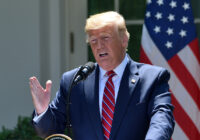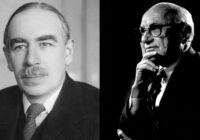This is part six of my series on why free market economics is a false religion. If you’re new to the series, start from the first installment here. You can check out the previous installment here. Stay tuned for the rest!
In response to the last part of my series on why free market economics is a false religion, my friend Tom served me up what you might call a big old softball. And it is my responsibility to crush that. Big swing.
“Please name one free-market economist who claims that the free market will ever be ‘perfect.’ 🙄🙄🙄🙄”
That’s one, two, three, four eye rolls there. Aren’t I so exasperating?
Now, Tom is kind of right; few modern economists profess that markets will ever be perfect. But as I mentioned in my post, perfect markets are an ideal. An ideal is something one strives for. As one strives for this ideal, one recognizes that it may never be attained — but it is a guiding star, a true north. And while you might realize that you’re probably never going to get there, there are always ways to get closer to that ideal. When we talk about perfect markets, there are always more regulations that can be lifted, more taxes that can be cut and more publicly-owned properties that can be sold off for private profit extraction that will get you closer to that imaginary ideal.
Good old Uncle Milty, Milton Friedman was dismissive of the idea of perfectly competitive markets. This is because those ideas were out of fashion by the time the Neoliberals came along. This is a common thing in the “science” of economics, ideas go in and out of fashion like Jean styles. Bell bottoms, in for young ladies? Skintight jeans on men? Out. Lowrise? Hopefully coming back. Pleated Jean Shorts? Out permanently.
Lots of economists really do believe in perfect markets
In the early 20th century, Vilfredo Pareto was quite trendy for developing Pareto optimality, or Pareto efficiency. This is an imaginary state of equilibrium, or perfect efficiency, where an action makes an individual or small group of individuals better off, and no one ends up worse off. Pareto spent a big chunk of his career developing these ideas. These ideas about perfect efficiency still dominate. According to an article published by the Federal Reserve Bank of Richmond, “Pareto efficiency has applications in game theory, multicriteria decision making, engineering, and many of the social sciences. It is a central principle in economics.”
But of course, my post was about neoclassical economics. Neoclassical economists — the OGs, the men who built the intellectual superstructure that forms the basis for our understanding of capitalism — talked about perfect markets a lot. Our conception of free market economics is based on what the neoclassical thinkers built. They developed the concept of general equilibrium theory. Perfect markets are defined by a set of ideal conditions known as perfect competition. This is what I was referring to when I supposedly built my grand straw man argument about perfect markets bringing about a state of economic nirvana. But Tom wants names, so we’ll begin with 19th-century economist Leon Walras, who helped define perfect competition. Later, in the 1950s, Swedish Central Bank Nobel prizewinners* Kenneth Arrow and Gerard Debreu further teased these theories out. Those were real economists. So that’s four names without even trying very hard.
*(You may want to see my previous blog post about the Economics prize.)
But, Tom will predictably remind me none of these were free-market economists. So, how about Eugene Fama, another Chicago school Nobel prizewinner?
He doesn’t believe in perfect markets per se. Instead, he says the market is perfect already! Fama gave us the efficient markets hypothesis, which tells us that financial markets are never wrong. Every share price perfectly reflects all publicly available information about a given asset.
Now, you don’t have to be a jaded day trader to realize this idea is absurd. To say that the market can never be wrong is to say that the market is infallible. Omniscience and infallibility are the domain of gods. By declaring that the market is all-knowing and can never be wrong, economists have moved firmly out of science and into religious faith. Of course, the market is not infallible. But why should reality ever get in the way of a good economic hypothesis?
Economics has gone beyond the bounds of science
These ideas about perfect markets, based on abstraction and ivory tower theory, are baked into free market economics. You can no more remove these ideas or ideals from this strain of economics than you can take the egg and flour out of a birthday cake when you’re getting ready to blow out the candles.
There is more to learn from capitalism’s critics than its cheerleaders.
Karl Marx spent his life examining capitalism. He read and wrote extensively about Adam Smith and David Ricardo and everything else he could get his hands on to understand how capitalism worked and where it broke down. We still talk about Marx because he is one of history’s greatest critics of capitalism. This is why he is still a threat, and why “Marxist” and “Marxism” are still thrown around like they are dirty words. Capitalism’s cheerleaders only want us to have positive associations with their favorite brand of economics. The free market faithful want us to believe, like they do, that there is only one true way to run an economy. They want us to believe that there are no alternatives. And don’t forget that “belief” is a word of faith.
Exposing the assumptions that the free market faith is built on is a valid way of criticizing capitalism. And free market fundamentalists HATE that. British economic historian Robert Skidelsky perfectly encapsulated how ridiculous it is to develop your economic philosophy around flawed assumptions the way capitalism does when he said, “lunatic premises lead to mad conclusions.” That’s the truth. And the world we live in today is proof. We are living with those mad conclusions, a society teetering on the edge of oblivion, because of lunatic premises like the ones I described in my last post.
Let’s make them pay.
[Liam Roman edited this piece.]
[Let’s Make Them Pay first published this piece.]
The views expressed in this article are the author’s own and do not necessarily reflect Fair Observer’s editorial policy.
Support Fair Observer
We rely on your support for our independence, diversity and quality.
For more than 10 years, Fair Observer has been free, fair and independent. No billionaire owns us, no advertisers control us. We are a reader-supported nonprofit. Unlike many other publications, we keep our content free for readers regardless of where they live or whether they can afford to pay. We have no paywalls and no ads.
In the post-truth era of fake news, echo chambers and filter bubbles, we publish a plurality of perspectives from around the world. Anyone can publish with us, but everyone goes through a rigorous editorial process. So, you get fact-checked, well-reasoned content instead of noise.
We publish 2,500+ voices from 90+ countries. We also conduct education and training programs
on subjects ranging from digital media and journalism to writing and critical thinking. This
doesn’t come cheap. Servers, editors, trainers and web developers cost
money.
Please consider supporting us on a regular basis as a recurring donor or a
sustaining member.
Will you support FO’s journalism?
We rely on your support for our independence, diversity and quality.











Comment